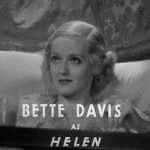 |
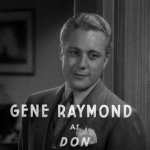 |
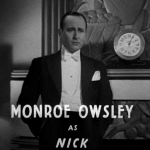 |
| Helen Bette Davis |
Don Gene Raymond |
Nick Monroe Owsley |
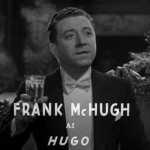 |
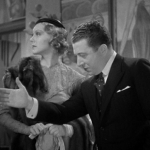 |
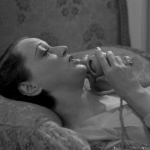 |
| Hugo Frank McHugh |
Iris Claire Dodd |
Peggy Kay Strozzi |
| Released by Warner Brothers | Directed By Robert Florey |
||
Proof That It’s Pre-Code
- A woman decides to flout modern morality and sleep with a man she loves before marriage. However, he begs her to reconsider and they do marry, only to find themselves miserable, so they divorce. They then return to sleeping together outside of marriage, only to be tempted into sleeping with other people. … Lots of sleeping in this one.
Ex-Lady: Y-Me
“Compromise is a defeat.”
I fell asleep in the middle of Ex-Lady. (This is that honesty thing I’ve heard so much about.) When I awoke, I rewound the picture to where I stopped, and, I have to admit, I was amazed. I had nodded off less than ten minutes from the end. Normally this would be the climax, or, you know, at least something would be happening.
But there’s no tension in Ex-Lady. We’re instead treated to an hour and some change of platitudes upon platitudes about love, will and desire by a cast of cardboard characters. It’s a remake of Illicit from a few years earlier with all of the blood drained out. Both movies asked, ‘can love survive marriage?’ I think Ex-Lady would be more honest if it asked whether a viewer can survive its full 67 minutes.
The story: Helen is a free spirit and professional artist who is sleeping with marketer Don outside of wedlock. She’s chastised by her horrified immigrant father (with hints that her parent’s ugly marriage has obviously affected her views), and, after much pestering and a character reversal for the sake of getting the damn plot going, Helen and Don end up married.
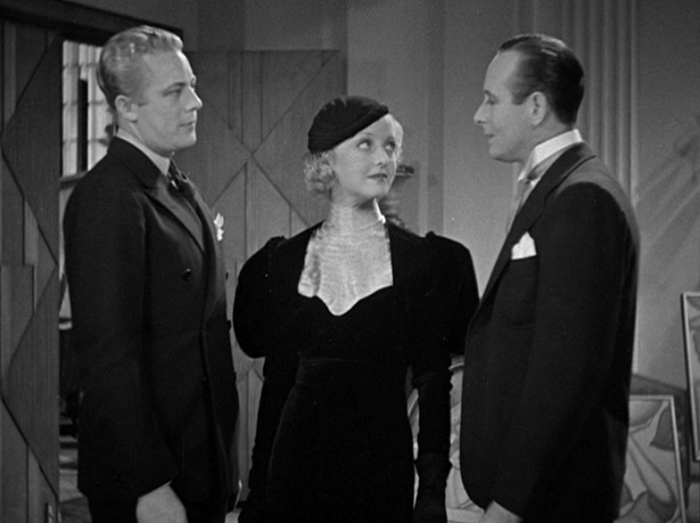
A bizarre love triangle.
But all is not happy in paradise– Don quickly comes to resent his new wife when she asks for a honeymoon and the vacation causes him to lose some big accounts at work. He also catches the eye of the married Peggy, and the two begin a rather obvious affair. Helen decides that the only thing that can save their relationship is divorce and possibly some jealousy-inducing canoodling with Nick, who’s like Don but looks like Monroe Owsley. Will Helen and Don end up together?
Don is the worst of the movie’s problems. Gene Raymond’s forward, smiling face is almost too sweet for his role as a serial sex fiend. There’s no grubby charm in him like you’d find in Lyle Talbot in The Divorcee. He’s even lacking his more rascally traits that he pulled off in Sadie McKee, where he committed adultery too. Here, he’s just kind of a blank slate of a jerk, a petulant child who wants to possess something and get his rocks off. But he’s also so bad at his job and so entirely humorless that it’s difficult to pin down what his appeal would be. It’s easy to root against him, so much so that he makes a better villain than the more aloof and playful Owsley.
Bette Davis, meanwhile, is miscast, plain and simple. When Helen spirals into depression and hits the bottle, you can see the life light up behind the actress’ eyes. She’s an actress infinitely more vital than the nymphette the movie tries to pigeonhole her as. Helen’s life, while the product of an attempt to be fashionable and outgrow her mother’s cuckolded life, never comes into focus; she wants good sex, but she always wants it from the same boring man in the same way. That’s not love, that’s insanity.
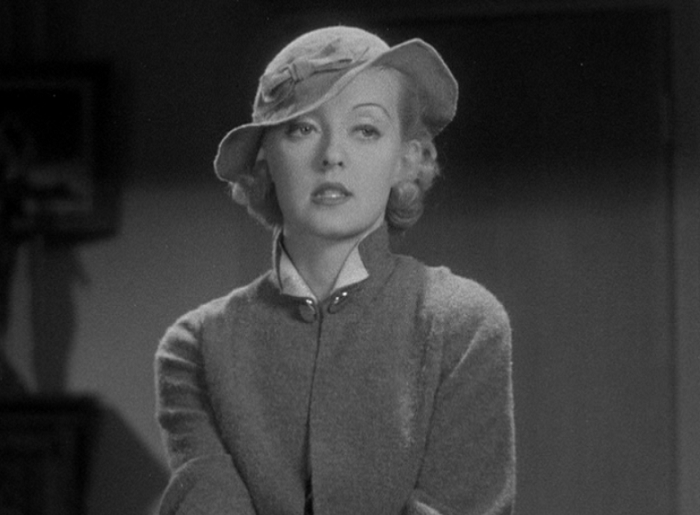
I know, Bette, I know.
The supporting cast is similarly adrift. Frank McHugh takes a step back from his usual weirdos to play Hugo as a poetry-sprouting automaton who can’t seem to kick his pulse up past a turtle’s pace. Weirdly, McHugh seems to have watched Illicit and is just doing his best Charles Butterworth impression; it’s not a bad fit but it still seems out of step with the rest of the film. It doesn’t help that Hugo the character is unreadable by nature. Why does he ask out Helen in the film’s final few minutes? Who knows. Must have been trying to inject something into the picture.
Claire Dodd plays Iris, Hugo’s wife, who only wants some attention. The same could be said of her performance, as its shunted off quickly and quietly. There’s also Monroe Owsley as the villain, but I’ll be honest– as slimy as he is to propose to Helen exactly what he wants, he’s nowhere near as weak and ineffectual as Don. Hell, he’s even successful. Sure, his face isn’t as nice and sometimes he pushes his case a bit too long, but at least he ain’t a shithead.
Ex-Lady is about the negotiation between a man and woman as to where and how the sex takes place. Back when this was filmed, sex was a bigger commitment– with fewer contraception options, the chance of pregnancy was obviously greater. But without babies even getting a namedrop, that tension is too ephemeral. It’s provocative for the time it was made, yes. But it’s a remake of a provocative movie that asked the same question barely two years earlier and answered with the same half hearted shrug.
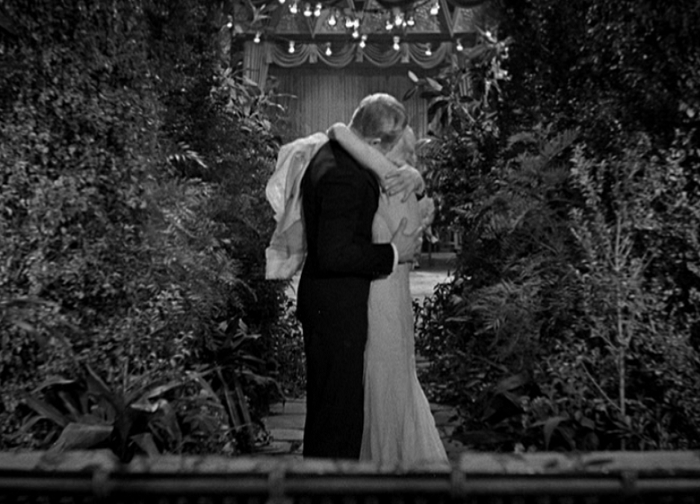
“Is this sex? Why won’t anyone tell me?”
There is some wit to be found in the proceedings which quick witted viewers can attempt to use as a way to avoid nodding off (perhaps longer than I did). Helen’s main objection to marriage is that it’s a ‘compromise’, or one side surrendering to the other in some matter where both feel strongly. Of course, that also evokes the idea of being compromised. The film uses this connection as it shakily tries to show Helen how men no longer respect your sexual boundaries once you’re divorced. By refusing to compromise, Helen became compromised. Funny, right?
… Look, I said ‘some wit’, not ‘clever wit’.
Director Robert Florey, whose eclectic career includes movies like Murders in the Rue Morgue, The House on 56th Street and Smarty(any person who directed Smarty automatically gets the eclectic label), does a number of nice visual tricks to try and dredge up some energy into the moribund proceedings. One scene where he shines is during Helen and Don’s honeymoon in Havana where their lust is at full mast– the two clearly being turned on by an undulating dancer is more risque than you’ll get for a while.
Another moment where the direction shines is during an impromptu recital where Helen first sees Don canoodle with Peggy. With a low angle on the singer and a faux operetta underlying the tension, it gives Davis’ the chance to underplay a pivotal moment in the movie. Of course, the scene also succeeds because it lacks the plodding dialogue that seems to bog down most of the rest of the film.
Ex-Lady‘s title is one of those that probably sounded nice and scandalous in the 30s, but it neither fits the movie… nor exactly is it the first thing that comes to mind for modern viewers. It’s probably better left alone, a misfire that gave Bette Davis definite knowledge of what not to do for the next steps in her fledgling career.
Gallery
Hover over for controls.
Trivia & Links
- As TCMDB notes, this is Bette Davis’ first starring role.
- I couldn’t fit this in above, but, yeah, Davis wears some absolutely ludicrous dresses in this movie.
- At one point Bette gets accused of being “a pre-War bloomer girl.” Lots of reading about women’s fashion trends between 1850 and 1930 can lead me to telling you that it pretty much just means she’s a tease.
- The Movie Night Group heartily disagrees with me on this one, saying that Davis ‘nailed it’. They talk about Helen’s feminist leanings and why she’s so sympathetic:
Early in the film, we get a telling image of Helen’s youth – a cold, authoritarian father and a passive, downtrodden mother (Bodil Rosing). With that one scene, we begin to understand Helen’s aversion to marriage, and her determination to not become the passive target of male domination. It’s also interesting that the parents are clearly immigrants, setting up a comparison between the Old and New World morals. It also floats in a negative picture of European culture, in an era of increasing American isolationism.
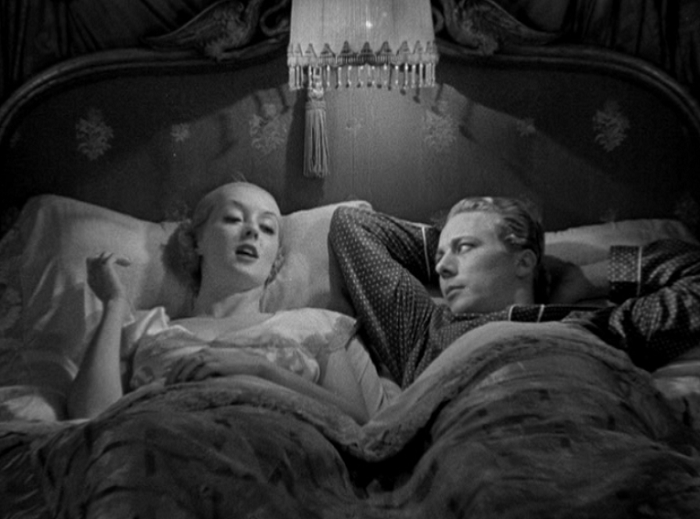
Calling someone ‘a pre-War bloomer girl’ is also the height of this film’s verbal wit.
- Glenn Erickson (AKA The DVD Savant) is also unhappy here, saying that the movie is essentially functioning outside Warner Brothers’ wheelhouse. He adds:
Ex-Lady tries to be sophisticated by making its showcase couple conscious of relationship problems, even as they stumble on simple romantic troubles one would expect to see in Junior High School. Helen makes a big noise about being bored and wanting her freedom, and Don’s respectful and courteous attitude vanishes as soon as work realities intervene. The context for these lovers doesn’t leave a lot of wiggle room.
- Senses of Cinema has a great piece about the film and its place in Bette Davis’ career.
She doesn’t want to live her mother’s life, but she struggles to reconcile her desire for freedom with her love for Don. When she finally adapts her idealism to the reality of their relationship, Helen realises that compromising is not admitting defeat, but a necessary sacrifice for a successful union. She accepts compromise, but keeps her feminist stance, refining it to accommodate the one she loves.
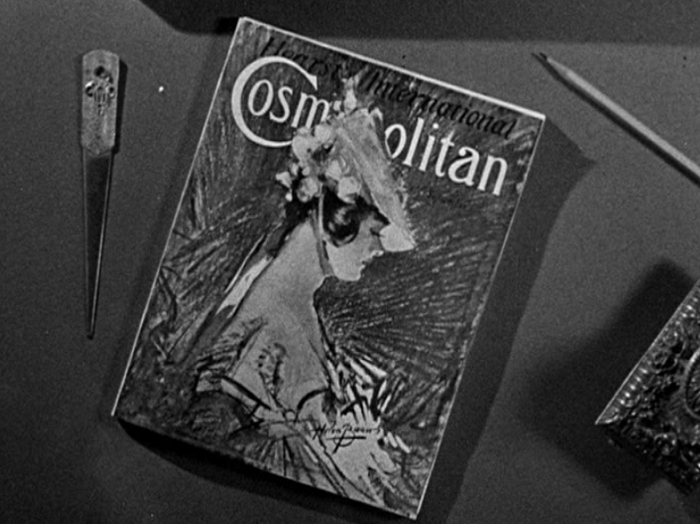
Cosmopolitan’s brief appearance in the movie seems to fit right in with the movie’s themes. At least, modern Cosmo would fit in.
- A couple of more screenshots over at DVD Beaver for you.
- Andre Sennwald in the New York Times eviscerates this one.
Bette Davis, a young actress who has shown intelligence in the roles assumed to her in the films, has had the misfortune to be cast in the principal role of “Ex-Lady,” now on view at the Strand. What that somewhat sinister event meant to her employers was that Miss Davis, having shown herself to be possessed of the proper talent and pictorial allure, now became a star in her own right. What it meant to her embarrassed admirers at the Strand on Thursday night was that Miss Davis had to spend an uncomfortable amount of her time en deshabille in boudoir scenes engaged in repartee and in behavior which were sometimes timidly suggestive, then depressingly näive and mostly downright foolish.
Awards, Accolades & Availability
- This film is available in the Forbidden Hollywood Volume 7 along with Skyscraper Souls, Employees Entrance, and Hatchet Man. You can pick it up on Amazon and Warner Archive.
Comment below or join our email subscription list on the sidebar! |
||
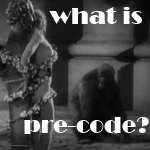 |
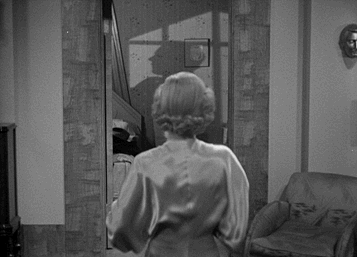 |
 |
 |
 |
|

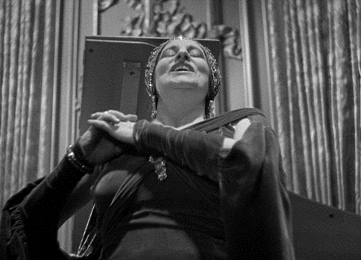


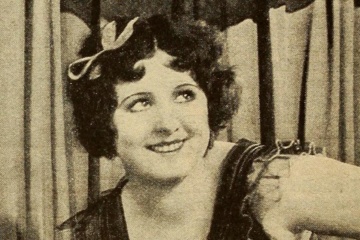
13 Comments
shadowsandsatin · August 4, 2014 at 6:52 am
I’m going to come back to read your post later, Danny, but I just had to pop in and see whether you liked, disliked, or were indifferent. Sometimes I play a little game with myself and guess before I look, and I was right this time!(Woot!) I’m especially looking forward to reading this because I’m in the midst of reading Bette and Joan: The Divine Feud, and I just finished reading about Bette’s making of Ex-Lady. I’ll be back!
Danny · August 7, 2014 at 12:02 pm
I don’t know if you ever came back, Karen, but I’m definitely curious about what you read about Bette’s experience!
Kevin Measimer · August 4, 2014 at 10:13 am
Thank you for the warning. Peace.
Danny · August 7, 2014 at 12:03 pm
To serve and protect, that’s my motto. It’s kind of catchy, I think…
Vanessa B (@callmeveebee) · August 4, 2014 at 11:45 pm
The only things I liked about this film were the following: the presence of Bette Davis, the presence of Frank McHugh, and Bette’s wardrobe. That’s it. Gene Raymond had zero chemistry with his leading lady and was horribly mis-cast in Ex-Lady (at least, I think he was).
By the way, I love your new blog header!
Danny · August 7, 2014 at 12:04 pm
I agree with your summary there— much better at being succinct than I was.
And the blog header actually rotates. There are six different ones that pop up occasionally. Really got to get around to adding more…
Marsha Collock · August 7, 2014 at 9:26 am
I’m with Vanessa – Bette looks so kick-ass gorgeous here, I can forgive everything.
Danny · August 7, 2014 at 12:06 pm
Ha! Have you seen Fashions of 1934? She looks pretty great there, too, and William Powell is no Gene Raymond, thank goodness.
claudia · August 7, 2014 at 9:01 pm
I will see this movie for the same reason I saw sadie mckee and others : gene raymond.he is so handsome, and so evil,I don t see why they cast him as a leading man when he was the perfect villain ,genre william warren.
Danny · August 8, 2014 at 8:53 pm
Ha! Gene Raymond just playing pure evil would probably be a relief at some point.
Michael · March 22, 2016 at 8:41 am
Honestly, the Orry Kelly gowns are the highlight of this movie…
Danny · April 13, 2016 at 12:43 pm
They’d have to be.
Chris · January 11, 2019 at 9:40 pm
This was Mother Goddamn’s first starring role. I think she looks gorgeous in this film. However the movie doesn’t work on many levels. Gene Raymond is the most miscast actor in the movie. He is too light, breezy and even a bit effete and him being with the likes Bette Davis in any romantic way even at this early stage of her career is ludicrous.
Comments are closed.